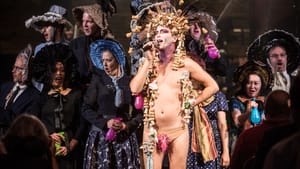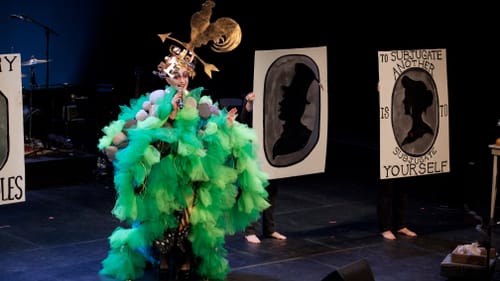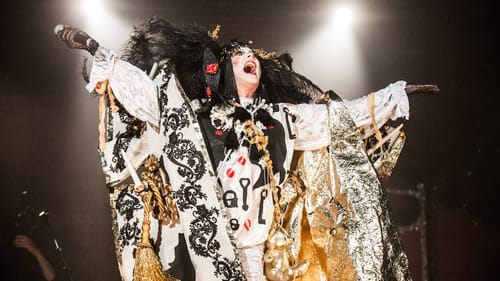Stay in the Loop
BSR publishes on a weekly schedule, with an email newsletter every Wednesday and Thursday morning. There’s no paywall, and subscribing is always free.
National anthems
PIFA 2018: Taylor Mac's 'A 24-Decade History of Popular Music, Part I, 1776-1896'

Has any work of art in recent memory come to town with higher expectations — or greater baggage — than Taylor Mac’s 24-Decade History of Popular Music? Presented as part of the Philadelphia International Festival of the Arts (PIFA), the universally ballyhooed, Pulitzer- and MacArthur-cited drag and performance artist takes over the Merriam Theater for two 12-hour deconstructions of the U.S. historical narrative.
Our past, Mac suggests, needs queering, racial reconsideration, and a healthy dose of empathy. The stains of colonialism, money worship, and the impulse to otherize entire cultures have trickled down to our current moment. Few in the audience (this reviewer included) would disagree.
That Mac chooses to explain and scrutinize our history through song is unquestionably ingenious. Since the dawn of civilization, music has been used to espouse belief systems, to unite and divide peoples, and to express everything from the ordinary to the holy. Judy (Mac’s chosen gender pronoun) cannily reimagines the American songbook as a living document to our successes and failures as a nation, a roadmap of our humanity and our cruelty as a country.
The Lord's work
Part I, which spans 1776 to 1896, began with “Amazing Grace” (sung shortly after noon) and ended with “In the Sweet By-and-By” (performed at 11pm). These choices seemed apt, as many in the audience spent the performance in a state resembling religious transcendence — dancing in the aisles, testifying, and even speaking in tongues. Although I found myself occasionally swept up in the fervor, I remain, overall, a respectful agnostic at best.
Mac’s performance of “Amazing Grace” did more to encompass judy's overall project than nearly anything that followed. Ordering the crowd to its feet, judy plucked a middle-aged woman named Sara from the fourth row and positioned her center stage. As Mac’s surprisingly smooth baritone wrapped itself around the hymn’s myriad verses, we were instructed to move our hips and hands, to sing and scream as we felt appropriate, and to send as much energy to the stage as we could.
A concert became a revival meeting, with an unassuming woman elevated to the level of a pagan goddess. From strangers, a community was forged. If the performance ended there, judy would have imparted a powerful message.
But it didn’t end there — not by a long shot — and for better or worse, judy spent the remaining hours building up and tearing down the bonds formed in the concert’s opening minutes. Somewhere around eight-hour mark, Mac described the goal of “preaching to and critiquing the choir.” In doing so, judy courted moments of revelation and banal redundancy.

Gwine to run all night
The former came across strongest in the concert’s early hours, where Mac explored the homophobic roots of “Yankee Doodle Dandy,” covert feminism in the years following the American Revolution, and the quietly subversive nature of drinking songs. It may be no small matter that these sections allowed Mac to trade on elements of judy’s own outsized personality.
Like any good drag artist, Mac knows how to get an audience eating from judy's hand. But few have Mac’s ability to bound up the personal and political in ways that feel largely unforced. I won’t soon forget how hilariously and elegantly judy linked a story of fetish play with the spirit of American iconoclasm and its flux in attitudes toward prostitution.
Judy’s focus on the Prohibition movement, complete with a temperance choir, dovetailed beautifully into a discussion of contemporary politics — chiefly, the desire of reactionary factions to privilege their comfort over the freedom of expression. What could have been silly ended up closer to chilling.
Other sections fared less well. A supposedly self-contained “jukebox musical” exploring the missionary mindset, Western educational practices, and the Indian Removal Act went on far too long and often seemed musically confused. (What was a Schubert lied doing in there?)
The most effective moment of this narrative strand, which recounted the Trail of Tears through an unamplified jug-band jam session, easily dwarfed the surrounding flab. A repeated gag about the musical’s Broadway potential was not nearly as funny as Mac seemed to think.

Mikado on Mars
Elsewhere, good ideas stretched to their breaking points. A cage match between Stephen Foster and Walt Whitman for the moniker “Father of American Song” began profoundly, with Whitman’s metaphysical verse sharply contrasting Foster’s minstrel ditties. One could hardly believe these were products of the same period — and that’s the point.
But after a while, the repeated excoriations of Foster’s racist music felt like reaching for low-hanging fruit — although it’s hard to argue with Mac’s observation that Foster’s “Massa’s in de Cold Ground” may be “the most evil song in the history of America.”
Mac’s decision to cap the evening with a production of Gilbert and Sullivan’s The Mikado set on Mars certainly captivated the senses, thanks largely to Mimi Lien’s intergalactic set and Machine Dazzle’s eye-popping costumes. But Mac failed to follow through in fully linking the operetta with Orientalism and exoticism, and judy never fully justified its presence from an American standpoint. More than anything else, it felt like spectacle for its own sake.
That question of style versus substance entered my mind at several points, particularly as the messages of the show became easier to telegraph. (Compassion, good! Heteronormativity, bad!) Mac too often joked about the research involved in creating the project — methinks judy doth protest too much.
By the end of the night, I left with admiration for Mac’s physical and vocal stamina, as well as the determination of judy’s brilliant musical director, Matt Ray, and team of “dandy minions.” But divine rebirth was not in the cards for me. Perhaps next week’s conclusion, which will carry the audience up to the present day, will convert me.
What, When, Where
A 24-Decade History of Popular Music, Part I: 1776-1896. Conceived and co-directed by Taylor Mac, with co-director Niegel Smith. Philadelphia International Festival of the Arts. June 2, 2018, at the Merriam Theatre, 250 S. Broad Street, Philadelphia. (215) 893-1999 or pifa.org.
Part II, 1896-Present: June 9, 2018. See PIFA schedule for details and tickets.
Sign up for our newsletter
All of the week's new articles, all in one place. Sign up for the free weekly BSR newsletters, and don't miss a conversation.

 Cameron Kelsall
Cameron Kelsall